How this 26-year-old ran 550km through Egypt’s Sinai desert – with the help of the Bedouin
Contending with a swollen ankle, unmarked terrain and a hostile landscape, Ria Xi faced a remarkable challenge crossing the vast desert – she tells Tamara Davison how local knowledge and support were invaluable to completing the ultramarathon safely

Your support helps us to tell the story
From reproductive rights to climate change to Big Tech, The Independent is on the ground when the story is developing. Whether it's investigating the financials of Elon Musk's pro-Trump PAC or producing our latest documentary, 'The A Word', which shines a light on the American women fighting for reproductive rights, we know how important it is to parse out the facts from the messaging.
At such a critical moment in US history, we need reporters on the ground. Your donation allows us to keep sending journalists to speak to both sides of the story.
The Independent is trusted by Americans across the entire political spectrum. And unlike many other quality news outlets, we choose not to lock Americans out of our reporting and analysis with paywalls. We believe quality journalism should be available to everyone, paid for by those who can afford it.
Your support makes all the difference.
Ria Xi had been running for about six days when disaster struck. The 26-year-old was halfway through her incredible mission, each step under the desert sun bringing her closer to becoming the first person to complete a never-before-done ultramarathon route in Egypt.
Suddenly, one slip of her foot between the asphalt and the sand sent her tumbling – twisting her ankle in a way that any runner would dread. “I landed on my right ankle really hard and thought ‘this is over,’” Ria explained, adding that the incident had ironically happened on her “rest day” in a remote part of the Sinai Peninsula.
Ria was on a mission to run 550km across Egypt’s Sinai Peninsula. She’d already completed hundreds of kilometres, endured testing desert elements and overcome countless mental hurdles when her swelling ankle cast uncertainty over whether she’d make it.
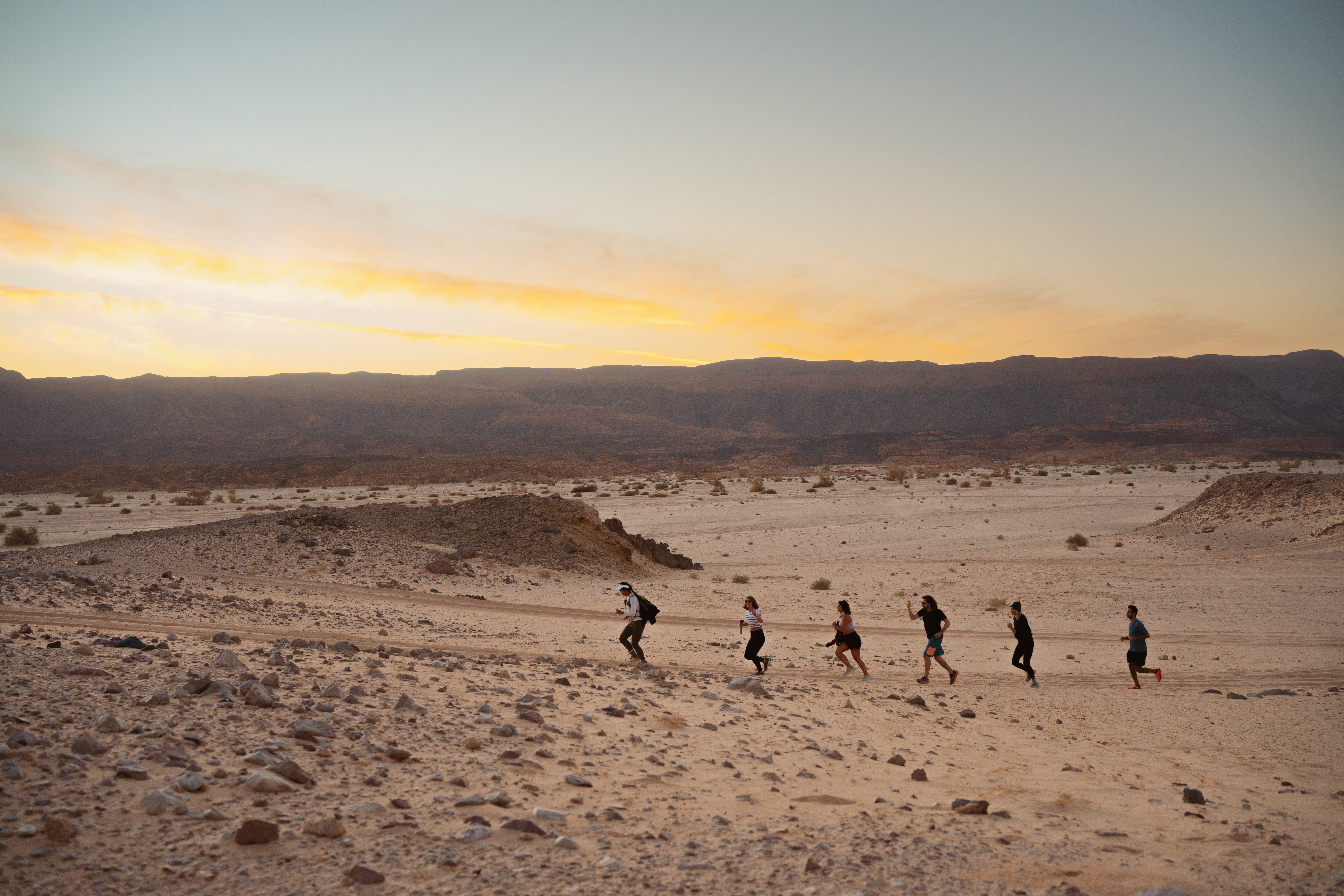
“I ended up running 46 kilometres on it anyway,” Ria explained, determined to push on. “Afterward, my foot was so swollen I didn’t think I could continue.” In that moment, Ria was also reminded of her strength, her past, and her resilience: something that she’d only truly discovered while running with the Bedouins in the desert.
“Even if I twist my ankle, get sick or face other setbacks, I can handle the pain and keep going. It’s a mindset that applies not just to running but to life,“ she explained. Miraculously, the swelling had subsided the following day, and she decided to press on.
The route Ria was running crossed the lands of eight Bedouin tribes and some of the nation’s highest mountain ranges. In late December 2024, Ria looked out across the expansive sandy landscape before her and started to run. Away from phone reception or any amenities, her goal was to run around 50km each day before camping under the stars.
Read more: The Middle East rock climbing group is bringing more women into adventure sports
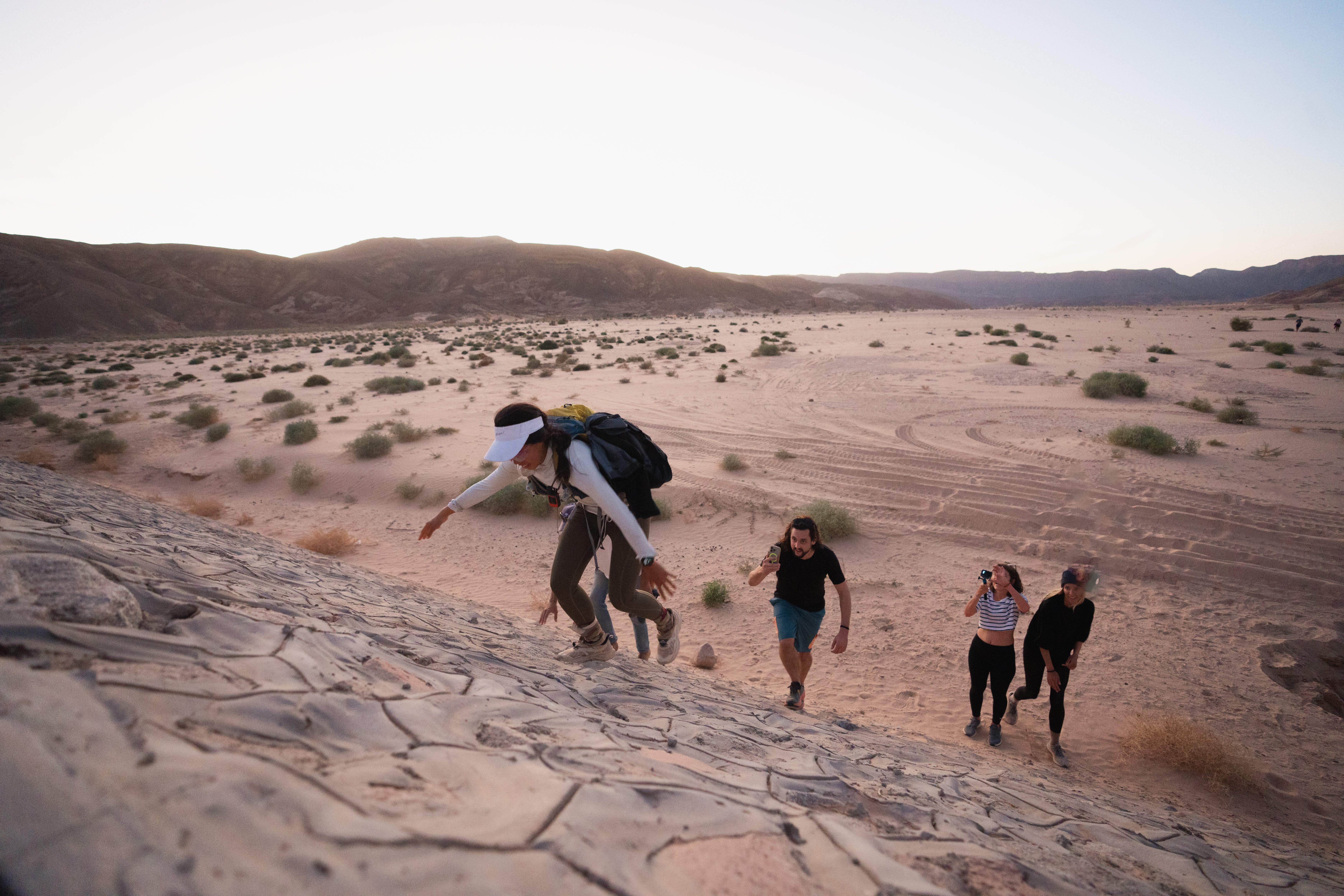
But running through the Sinai desert was no ordinary challenge. The route was unmarked, and the terrain was unpredictable, so she had to rely on local knowledge to cross the vast, unchartered land. To ensure she stayed en route, a group of Bedouin guides would usually drive ahead of Ria with gear and food, but on some occasions, they also ran alongside her.
The Bedouins of the Middle East have been custodians of the Sinai desert for centuries, passing down a unique understanding of the land through generations. While few of Ria’s guides spoke English, she trusted their navigational knowledge to cross the terrain safely. “I learned that guiding isn’t just a modern thing – these tribes have been guiding pilgrimages for thousands of years,” she explained, noting groups may have historically passed through this region on the way to Mecca or Mount Sinai. “Their knowledge of the land and its resources is ancestral.”
Read more: Southern Sinai’s secluded beach camps offer a different side to Egypt
Throughout the 13 days, Ria would start at around 6.30 am each day, crossing valleys, dunes and mountains alongside her guides. She discovered spectacular little-known architectural wonders and even ancient Egyptian hieroglyphic inscriptions along the way. “Near Nuweiba, there are some of the oldest stone structures in human history – burial houses dating back to 3,000 or 4,000 BC. It’s insane to think they’re just right there,” she said.
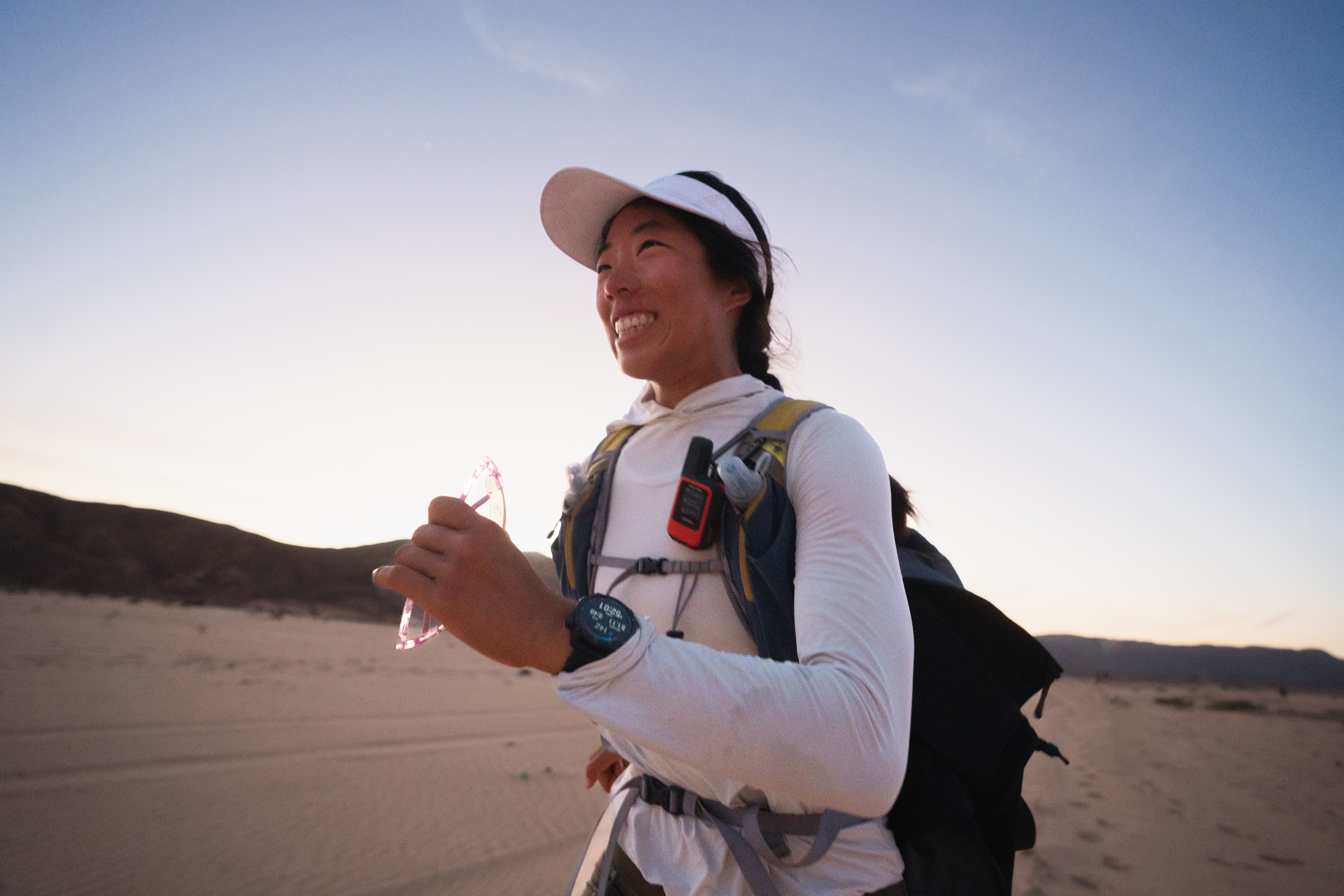
At other points, she was left utterly in awe of the natural landscapes before her. “I felt like I was in the Mojave Desert or Death Valley – wide-open desert with huge mountains in the distance. It was really, really incredible,” she added. “There were places with just sand dunes, where there was no path at all. Even the footprints would be blown away in no time.” As the sun began to set, Ria would sleep wherever her guides found shelter, sometimes in caves or abandoned houses or directly under the stars.
Like any ultra-marathon runner, Ria was also confronted with breaking through several “walls” on her epic endeavour. “The first three days, I just felt so lonely,” she explained, adding a language barrier with her guides made it challenging to discuss the upcoming route or even to know how far along she was on the Sinai Trail. “It was something I didn’t expect to feel. Some people say ultramarathons are pure mental games, and I didn’t realise how much it would affect me.“
Read more: 12 of the best things to do in Egypt, from Nile river cruises to hot air balloon rides
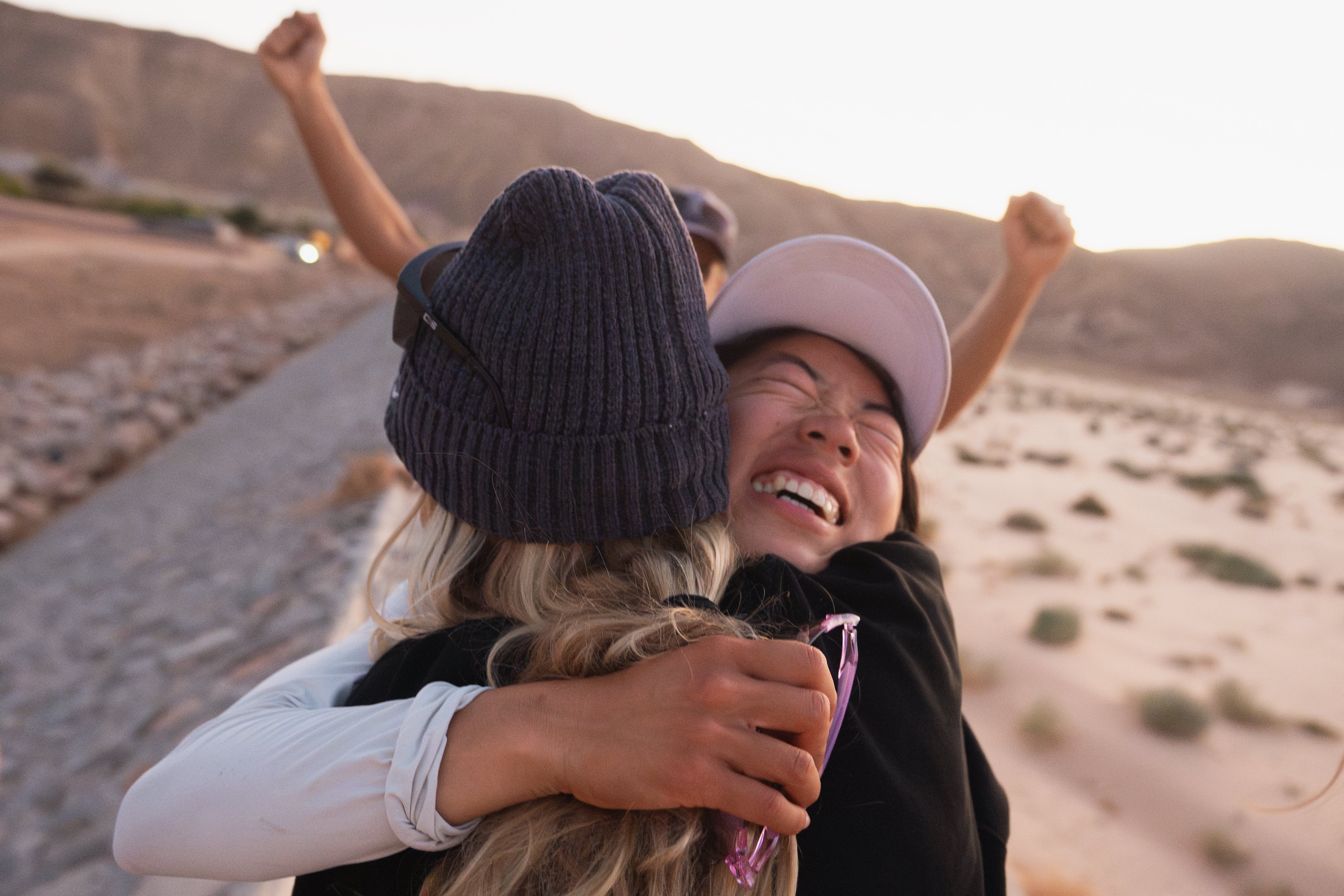
It wasn’t long before her body also started to feel the strain. Temperatures in the desert often drop below zero degrees at night during this time of year, and her immune system started to struggle. Incredibly, despite suffering from congestion and flu-like symptoms, Ria found the strength to push on. Listening to audiobooks of other endurance runners, such as Russ Cook, helped inspire her to keep placing one foot in front of the other.
When it came to the final stretch of her run, Ria was joined by several friends from Dahab who ran alongside her as she neared her finish line. On 7 January 2025, Xi finally completed her mission – in 13 days, she’d run the equivalent of almost 12 marathons back-to-back, crossing spectacular desert landscapes and unlocking a new awareness of her abilities and the magic of the Sinai desert and the people who call it home.
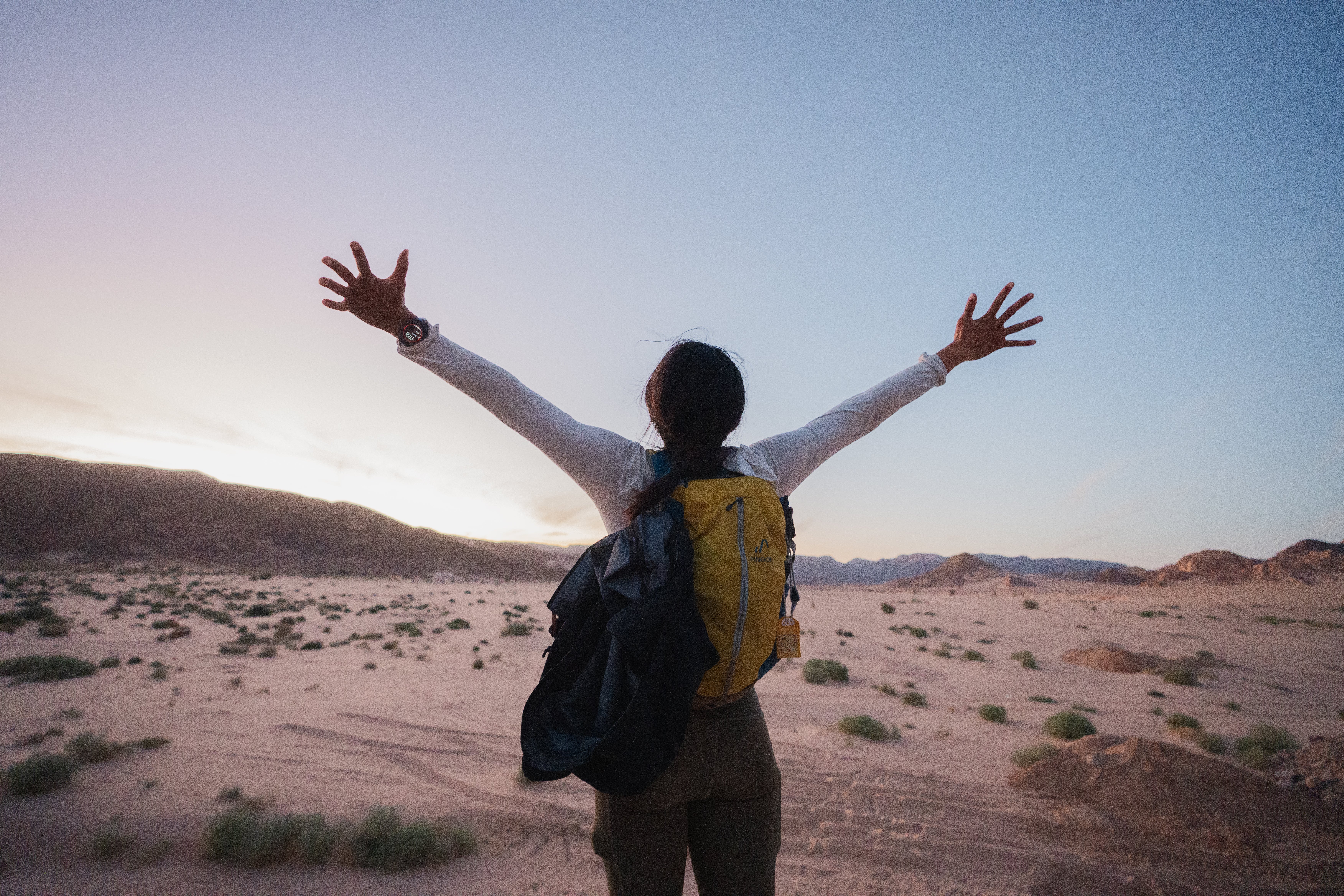
Over a week after returning to reality, Ria is still processing what she has accomplished. While she’s now excited about attempting future ultramarathons, she hopes her recent journey will encourage others to step out of their comfort zones.
What had started as a simple idea has left the runner with a new sense of purpose. The fact that the ultramarathon route was first completed by a woman was just an added bonus: “I think it’s empowering to push the boundaries of what’s possible and to show that women can take on these challenges,” she proudly said. “This run taught me so much about my inner strength. My mom always said resilience was our family’s biggest strength growing up. I didn’t believe her, but now I see she was right.”
Read more: This boho enclave is the perfect alternative to Egypt’s touristy Red Sea resorts

 Kass
Kass 





























